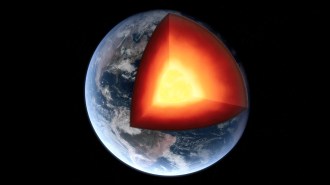
Climate
Take it from the Olympics, slushy winter sports may be the new normal
Ice arenas and artificial snow now dominate the winter Olympics. Athletes there — and everywhere — may need to adjust how they train and perform.
Every print subscription comes with full digital access

Ice arenas and artificial snow now dominate the winter Olympics. Athletes there — and everywhere — may need to adjust how they train and perform.
We summarize the week's scientific breakthroughs every Thursday.

Antarctic Peninsula projections show accelerating ice loss, warming oceans and global sea level impacts tied to greenhouse gas emissions.

Sediments from Scotland hint that ocean-atmosphere interactions continued more than 600 million years ago despite widespread ice.

New plankton arrived just a few millennia — maybe even decades — after the Chicxulub asteroid, forcing a rethink of evolution's catastrophe response speed.

Hydrogen reserves in Earth’s core large enough to supply at least nine oceans may influence processes on the surface today.

A temperate tunneling species of dung beetle seems capable of adapting to climate change, but their tropical cousins may be less resilient.

Polar bears can struggle to adapt to climate change. Bears on Svalbard may be surviving on land prey and seals — but scientists warn it may not last.

Seismic tremors reveal a shallow fragment of an ancient tectonic plate beneath Northern California, helping explain damaging earthquakes near the surface.

An analysis of global climate data shows sustained warming even as El Niño faded.

Trees are known for absorbing CO2. But microbes in their bark also absorb other climate-active gases, methane, hydrogen, and carbon monoxide.
Subscribers, enter your e-mail address for full access to the Science News archives and digital editions.
Not a subscriber?
Become one now.